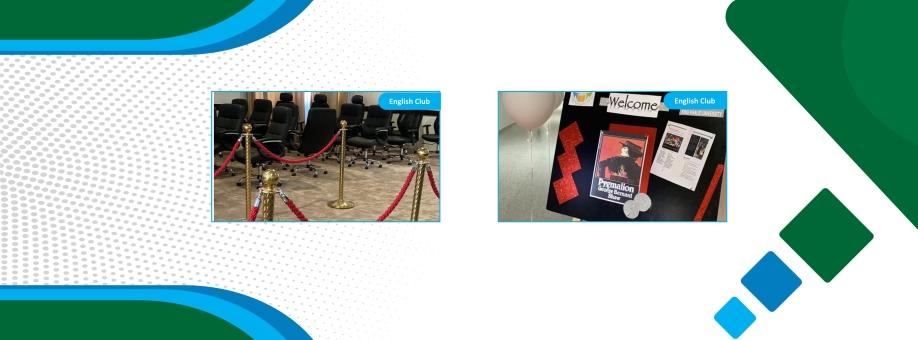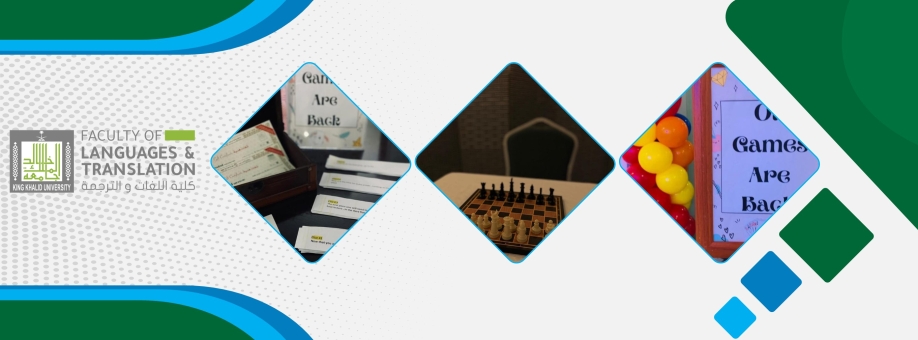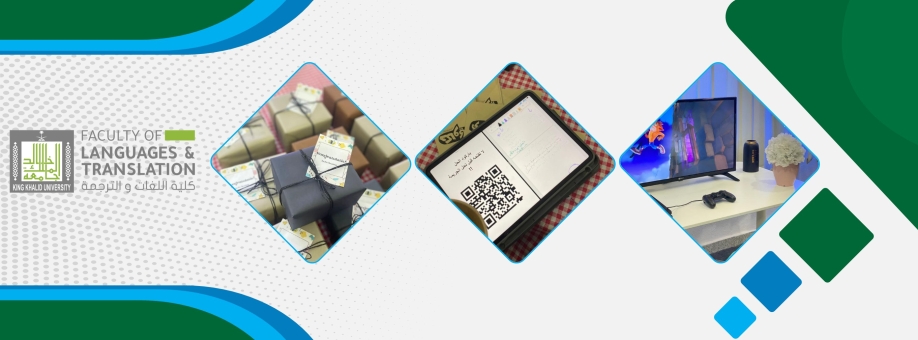Roundtable Discussion About Translation
On March 2, 2022, the Scientific Research Unit organized a virtual roundtable discussion about translation.
The discussion started by highlighting the significance of translation and translation studies as a field that deals with theory, description, and application of translation. The moderator of the discussion, Dr. Amal Metwally, introduced the field as an interlingual transfer and as intercultural communication. She further pointed out that translation studies can also be described as an interdiscipline, which touches on other diverse fields of knowledge, including cultural studies, comparative literature, linguistics, semiotics, rhetoric, technology in translation, and many other fields.
The moderator then introduced the speakers who are lecturers and promising researchers who achieved great success and accomplished their MA in translation in prominent universities during their scholarships.
Ms. Asma Alahmari, a lecturer at the Faculty of Languages and Translation, talked about her research in translation and her dissertation entitled "Comprehensive Text Analysis of the Arabic Translation of The Alchemist by Paulo Coelho". She discussed the discipline of translation versus the professional practice of translation. Ms. Alahmari also referred to the significant methods to measure the quality of translation and raised a question about "the voice of the translator". She also highlighted some examples from her own experience as an MA student and researcher at the University of Birmingham from 2019 to 2020.
The second speaker is Ms. Raghad Alqahtani, a lecturer at the College of Science and Arts, Ahad Rufaidah. Ms. Alqahtani also got her MA in Translation Studies from the University of Birmingham in 2019 and 2020. Her MA thesis is entitled “An investigation into Translation Studies Curricula at Postgraduate Level in Terms of Students’ Needs Market Demand: The Case of Saudi Arabia’s KKU and KSU”. In her research, she examined the status of translator training in Saudi Arabia by choosing two translation postgraduate programs (i.e., KKU & KSU). She asserted that the results of her study showed that the two programs were compatible with some observations. The study indicated that the majority of the students expressed a level of satisfaction with the programs as a whole. She added that students’ satisfaction was coupled with some comments indicating that curricula developers must consider some improvements. When asked about translation and technology, she confirmed that according to her study, students’ responses to translation technologies express a severe weakness in its integration in translator training programs.
Then the discussion went to the third speaker, Ms. Rafif Najmi, a lecturer at the Faculty of Languages and Translation, who got her MA in translation from the University of Leeds. In answering the question, "Why did you go for a project and not a dissertation?" Ms. Rafif indicated that it was one of "the toughest decisions", as she said. She clarified that many universities in the UK that have translation programs provide the options of either a dissertation or a translation project. She stated that she thought about focusing entirely on the project because it is more connected with the field of translation and as a future Ph.D. candidate. She needed to experience the practical side of translation before exploring its theoretical part. She also added that choosing a project won’t affect the Ph.D. approval. A lot of the students back then who went for the project are now Ph.D. students, and that didn’t stop them.
The interesting discussion guided the moderator to ask her about her project topic. Ms. Rafif Najmi indicated that her project involves a long annotated translation. She has to choose a book that has never been translated before and translate 8 to 10 words of the book. Her choice was "Master Your Emotions: The New 5-Step System to End Anxiety, Defuse Anger and Defeat Depression & Negative Thinking". She pointed out that after translation, an introduction that must involve an overview of the book, author and publisher, source text analysis, text genre, type, and function, register, the rationale (i.e., why have you chosen that book in particular), target readership, strategic approach, and a commentary should be written.
Ms. Najmi also referred to many challenges she faced while working on her project, including literary and psychological aspects of the source text genre, the issue of equivalence, religious and ideological backgrounds of TL readership, the cultural differences between cultures, and the view of the ST through the eyes of the TL readers. Another issue was the rendering of idiomatic expressions that are abundantly dispersed around books of this genre.
The discussion, which was mainly designed for translation students, was also attended by staff members who are interested in translation and translation studies. To view the speaker lineup, please click here.
The moderator of the discussion got positive feedback from many students on the roundtable discussion. Some of these views are included here:
"It was a wonderful discussion. It was a supportive discussion that helps us to continue our study in translation and take it as our aim. I think we need more discussions like this to take our plans and chance in a great way". – Khairiya Abdullah Ali
"Ms. Asma Alahmari, Ms. Rafif Najmi, and Ms. Raghad Alqahtani spoke about their experiences and their plans. They talked about some of the difficulties they faced and how they dealt with them. It was a good discussion and helps us so much". – Manar Ayied
"It was a very helpful discussion for us as students of the Faculty of Languages and Translation, and I hope it will be repeated many times with different members". – Shaima Abdullah
"It was such a great discussion which helped me understand more things about what I should do with my journey in translation after graduation. I really appreciate that such discussion took place and was very thankful for Dr. Asmaa, Dr. Rafif & Dr. Raghad’s answers, and Dr. Amal’s questions and lovely presenting. I would love to attend more of these discussions" – Rahaf Mukhtar
Date: 3/10/2022
Source: Dr. Amal Mewally, Head of Scientific Research Unit - Women's Section



